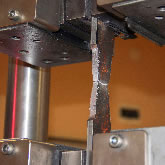
Tungsten Alloys are produced with a high Tungsten content ranging from 90% to 97% by weight. Below are the physical and mechanical properties of Tungsten Alloys we supply.
Tungsten Alloys are commonly referred to as Tungsten Heavy Alloys (WHA). ASTM B777-15 defines four different classes for this alloy which are differentiated by their nominal densities.
These alloys are supplied as either magnetic or non-magnetic depending on the use of either Iron or Copper as a binder. The magnetic variation uses Iron as the binder. If non-magnetism is needed, Copper is used as a binder. Ed Fagan stocks Tungsten Alloys under the name EF 17. It is named for its specific gravity, which is a nominal 17 g/cc as specified in ASTM B777-15 as Class 1.
We also can source Class 2 (17.5 g/cc), Class 3 (18 g/cc), Class 4 (18.5 g/cc). Call us at 1-800-628-6268 if you require these densities.
Tungsten Heavy Alloys (WHA) have particularly high density which:
- absorbs radiation and can be a more environmentally friendly alternative to Lead as a shield.
- makes it the ideal material for a wide range of applications found in aerospace, automotive, medical engineering and construction industry.
- are used for vibration damping in machine tools.
Benefits of Tungsten Heavy Alloys
- High density of 17.0 to 18.5 g/cc (similar to pure Tungsten)
- Better machinability compared to pure Tungsten
- Inexpensive to manufacture complex products and components
- High vibration absorption and excellent rigidity
- High absorption capacity for X-rays and gamma rays
- Harmless to the health and environment
For an Ed Fagan Tungsten Alloys data sheet, or any other Refractory Metals & Alloys data sheets, please go to the Data Sheets section in our Technical Library.
Tungsten Heavy Alloys (WHA) Typical Properties |
||||
|---|---|---|---|---|
| EFI Grade | EF17 | EF175 | EF18 | EF185 |
| ASTM B777-15 | Class 1 | Class 2 | Class 3 | Class 4 |
| Nominal % Tungsten | 90 | 92.5 | 95 | 97 |
| Nominal Density g/cc* | 17.00 | 17.50 | 18.00 | 18.50 |
| Minimum* Ultimate Tensile Strength UTS (ksi) | 110 | 110 | 105 | 100 |
| Minimum* Elongation % | 5 | 5 | 3 | 2 |
| Modulus of Elasticity (ksi) | 45,000 | 48,000 | 50,000 | 52,000 |
| *See ASTM B777-15, Table 1 for actual density range | ||||
*Note: Non-magnetic compositions (N) conforming to EF17, EF175 and EF18 shall have minimum properties of 94 ksi minimum ultimate tensile strength. Minimum elongation shall be 2% on EF17 and EF175 and 1% on EF18.
Tungsten Heavy Alloys (WHA) Typical Physical Properties |
||||||||
|---|---|---|---|---|---|---|---|---|
| EFI Grade | EF17N | EF17 | EF175N | EF175 | EF18N | EF18 | EF185 | |
| Class 1 | Class 1 | Class 2 | Class 2 | Class 3 | Class 3 | Class 4 | ||
| Magnetism | Non-Magnetic | Magnetic | Non-Magnetic | Magnetic | Non-Magnetic | Magnetic | Magnetic | |
| Nil | Slight | Nil | Slight | Nil | Slight | Slight | ||
| Density | g/cc | 17 | 17 | 17.5 | 17.5 | 18 | 18 | 18.5 |
| Lbs/in3 | 0.62 | 0.62 | 0.63 | 0.63 | 0.65 | 0.65 | 0.67 | |
| Composition | W, Ni, Cu | W, Ni, Fe | W, Ni, Cu | W, Ni, Fe | W, Ni, Cu | W, Ni, Fe | W, Ni, Fe | |
| Source: ASTM B777-15 | ||||||||
Tungsten Heavy Alloys (WHA) Specifications |
||
|---|---|---|
| ASTM B777-15 | AMS 7725C | SAE-AMS T-21014 |
For additional information on specifications of the materials distributed by Ed Fagan, please visit the websites of the international organizations that develop and publish technical standards: ASTM International and ASM International.
